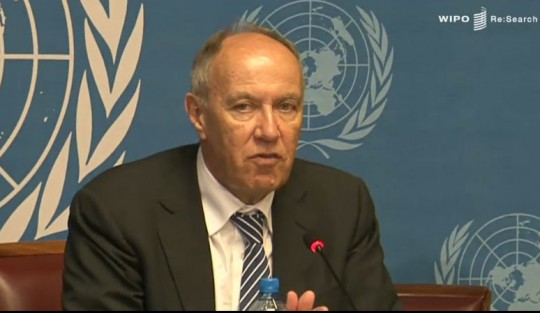Search for malaria and tuberculosis vaccines put on fast track by UN partnership
Search for malaria and tuberculosis vaccines put on fast track by UN partnership
26 October 2011
Under the agreement between the UN World Intellectual Property Organization (WIPO), which is entrusted with defending intellectual property such as trademarks, patents and copyrights, the companies and the non-profit BIO Ventures for Global Health (BVGH), public and private sector organizations will share valuable intellectual property (IP) and expertise with the global health research community on WIPO Re:Search, a virtual platform.
“WIPO Re: Search is a ground breaking example of how a multi-stakeholder coalition can put IP to work for social benefit,” WIPO Director General Francis Gurry said at the launch ceremony in Geneva.
“By joining WIPO Re:Search, companies and researchers commit to making selected intellectual property assets available under royalty-free licences to qualified researchers anywhere in the world for research and development on neglected tropical diseases, malaria, and tuberculosis.”
Membership in WIPO Re:Search as a user, provider, or supporter is open to all organizations backing the project’s guiding principles, including the commitment that IP licensed via WIPO Re:Search will be royalty-free for research and development on neglected tropical diseases in any country, with sale of disease medicines also royalty-free in or to so-called least developed countries (LDCs).
WIPO’s partners include Alnylam Pharmaceuticals, AstraZeneca, Eisai, GlaxoSmithKline, MSD1, Novartis, Pfizer, and Sanofi, in cooperation with BVGH, the United States National Institutes of Health (NIH), and multiple non-profit research organizations.
“WIPO Re:Search has the potential to make a real impact on global health,” said AstraZeneca chief executive David Brennan, who is also president of the International Federation of Pharmaceutical Manufacturers & Associations (IFPMA).
The WIPO Re:Search database includes a wide variety of contributions relevant to malaria, tuberculosis, and other neglected tropical diseases, including individual compounds and associated data, screening hits from compound libraries, and expertise and know-how in pharmaceutical research and development. Through it, researchers into neglected tropical disease can work directly with scientists at pharmaceutical companies.
According to the UN World Health Organization (WHO), these diseases blight the lives of over a billion of the world’s poorest 2.7 billion people – blinding, deforming in ways that hinder economic productivity, maiming, debilitating and killing, with costly consequences for societies and health care. Linked to poverty, they have traditionally offered little incentive to industry to invest in developing new or better products for a market that cannot pay.
Apart from malaria and tuberculosis, they include Chagas disease (trypanosomiasis), dengue and dengue haemorrhagic fever, guinea-worm, yaws, human African trypanosomiasis (African sleeping sickness), leishmaniasis, leprosy, lymphatic filariasis, rabies, schistosomiasis, trachoma and snakebite.
“We want to ensure that our biological materials and patents covering treatments or vaccines for neglected tropical diseases, as with all diseases, are available as broadly as possible to speed the development of new products for people who are most burdened by these diseases, and WIPO Re:Search helps us to do this,” said NIH Director Francis Collins.
###
> United Nations (UN).
 The United Nations was established on 24 October 1945 by 51 countries committed to preserving peace through international cooperation and collective security. Today, nearly every nation in the world belongs to the UN: membership totals 192 countries.
The United Nations was established on 24 October 1945 by 51 countries committed to preserving peace through international cooperation and collective security. Today, nearly every nation in the world belongs to the UN: membership totals 192 countries.
When States become Members of the United Nations, they agree to accept the obligations of the UN Charter, an international treaty that sets out basic principles of international relations. According to the Charter, the UN has four purposes:
- to maintain international peace and security;
- to develop friendly relations among nations;
- to cooperate in solving international problems and in promoting respect for human rights;
- and to be a centre for harmonizing the actions of nations.
###
* The above story is adapted from materials provided by United Nations (UN)
** More information at United Nations (UN)




















